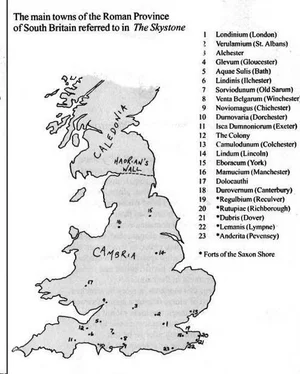They began to realize that they had no bad officers. At least, they said, not bad compared to what the other cohorts had to put up with. Britannicus had cleaned out his officer corps within weeks of his arrival, and now it seemed that any new officer in the Second Cohort was quickly made to shape up, or move out. No officer ever took advantage of an enlisted man in the Second Cohort; punishment was swift, severe and certain, but victimization was unknown.
The men discovered that they were always well fed — far better fed than the other units around them, where officers had other things to consider ahead of the diets of their men. Britannicus, it was observed, put the welfare of his men — their food, their equipment and their billets — above everything else.
The cohort had been under his command for two years when Aaron Flavius, pilus prior and thus my opposite number in the First Cohort, came to me late one afternoon and asked me to arrange an interview for him with Britannicus on what he termed "a personal and confidential matter." Too surprised to demur, I took Aaron's request directly to Britannicus. He had been in a foul mood all day long and was clearly uncomfortable with such an unusual request. His frown darkened to a forbidding scowl immediately, and he growled, "What does he want to see me about, Centurion?"
I spoke to a point in the air above his left shoulder. "I don't know, Tribune." We were being very formal that day.
"Are there no officers in his own cohort? And what about the primus pilus?" These were obviously rhetorical questions, so I said nothing. "Very well, send him in," he snapped. So in went Aaron Flavius, red-faced and ill at ease, but clearly determined about something. I was more than simply curious. This kind of thing was unheard of in the Roman army. I hung around outside, hoping to find out what was going on.
Flavius was in there for about a quarter of an hour, and when he came out, saluting at the door and whirling like a doll on his heel, I was waiting for him.
"What was all that about?"
He looked at me very strangely. "You'll find out," he growled, and then he marched out of there like one of my own men on defaulters' parade. I watched him go, scratching my chin as I wondered what was going on. The two men on guard duty, I realized, were watching me curiously. I rounded on them.
"What in blazes are you two gawking at? Hoping I'll take you into my confidence, are you? Get your minds on your work or I'll have you on latrine duty for a month."
I heard the door open behind me.
"Centurion Varrus."
"Tribune!"
"Join me, please."
"Yes, sir!" I withered the two guards with one last baleful glare and made my way into Britannicus's office, where I closed the door at my back, snapped to attention and saluted.
"Sit." The word came as a peremptory bark, more a command than an invitation. His face was turned downward in the act of reading something he had just written, so I could not see his expression, nor could I gauge his frame of mind from the tone of his voice in that one word. Reserving judgment on his mood, therefore, I sat on one of the two chairs facing his table and waited for him to get around to whatever it was he wanted to tell me.
He was in no hurry. He read the papyrus in his hand again, from top to bottom, his lips moving as he whispered the words for his own ears. Then he picked up a pen from an ink pot and signed his name to whatever it was he had written. That done, he turned his gaze on me, a wide-eyed stare I had come to know well. That particular expression meant he was looking but not seeing. His eyes seemed fixed on me, but his thoughts were elsewhere. I waited. Finally his gaze sharpened again and focused on me, and I knew he had arrived at a decision.
"Well," he asked me, "what do you think?" I kept my face blank. "About what, Tribune?"
"About that nonsense," he said, waving his hand towards the door.
"Your friend, Aaron Flavius."
Still I allowed nothing to show on my face. "What about him, Tribune?
What nonsense?"
He was staring at me now with an expression of mild incredulity, and his next words came in a softer tone. "You really don't know, do you?" I said nothing, and he rose from his chair and began to pace around, undoing the buckles on his breastplate as he moved and spoke.
"I found it hard to believe that he hadn't told the primus pilus," he said, talking almost to himself. "I mean, Catullus is going to cut him a new anus for coming to me without going through him, bypassing the chain of command. But I didn't believe he wouldn't have talked it through with you at least, since he had to go through you to get to me. Here, help me with this, will you?"
I moved to help him with the last set of buckles beneath his right shoulder, the same ones I could never undo by myself. He shrugged out of the heavy leather cuirass and placed it on the floor by his feet, then stretched mightily and tugged at his tunic until it hung comfortably again.
"That's better! Now it feels like the end of a long, miserable day in garrison." He crossed to a wall cupboard and brought out two cups and a stoppered jug of wine. "Sit, man, sit, sit, sit in the name of Mithras and relax. You are now officially off duty, by my personal dispensation. I need your advice. Here." I took the cup of wine he offered and he sat across from me and raised his cup to eye level. "Let us drink to the health, although we may deplore the wisdom, of Aaron Flavius, pilus prior of the First."
I raised my own cup. "Gladly," I said, "but why? What's Aaron up to?"
"What's he up to? An excellent question. Would you trust him?" The question confused me. "Trust him? I don't know, Tribune. It would depend on what was involved. Trust him with what? With my life, in battle? Certainly, of course I would. With my sister, if I had one? Probably not. I don't think I would be that big a fool. Trust is a relatively changeable commodity, Tribune."
"Hmmm, I agree, and a strange one, too." He slouched further down into his chair, his long, muscular, aristocratic legs stretched out towards the empty brazier in the corner of the room, and took a deep swig of his wine.
"He came to me in trust, and with a bizarre request, one that required tact, subtlety and diplomacy to a degree I'm not used to finding in centurions, apart from yourself." I held my peace and he continued. "He asked me to arrange a contest between our cohort and his own. He says he likes what he sees happening with our people, and he doesn't think much of his own Tribune or the performance he gets from his troops. That was where he had to be tactful, telling that to me. Anyway, as pilus prior, he believes the only way he'll ever be able to get his own people-excited enough to smarten up is by having us challenge them, unit to unit. He thinks they're likely to see a challenge like that as insulting to their sense of priority. They are, after all, the First Cohort and therefore, by definition, the best soldiers."
"Ah, but by whose definition, Tribune? They're the senior soldiers, the most experienced, certainly, but the best?" I emptied my cup and he immediately filled it again. It occurred to me as he turned away that I could not think of any other officer who would ever be gracious enough, or sure enough of his own power, to serve a subordinate unselfconsciously.
"So who are the best?" He spoke over his shoulder. "Ours? What do you think of the challenge idea? Be truthful — this is just between you and me, man to man, out of uniform. Will it work? Can we challenge them? I mean, is it feasible that our men would back the challenge if we made it?" I drank again and thought about the question before answering him. The wine was excellent; a far cry from the thin, sour vinum we drank normally. The question was a complex one. Finally, I shrugged my shoulders and admitted my ignorance.
Читать дальше









